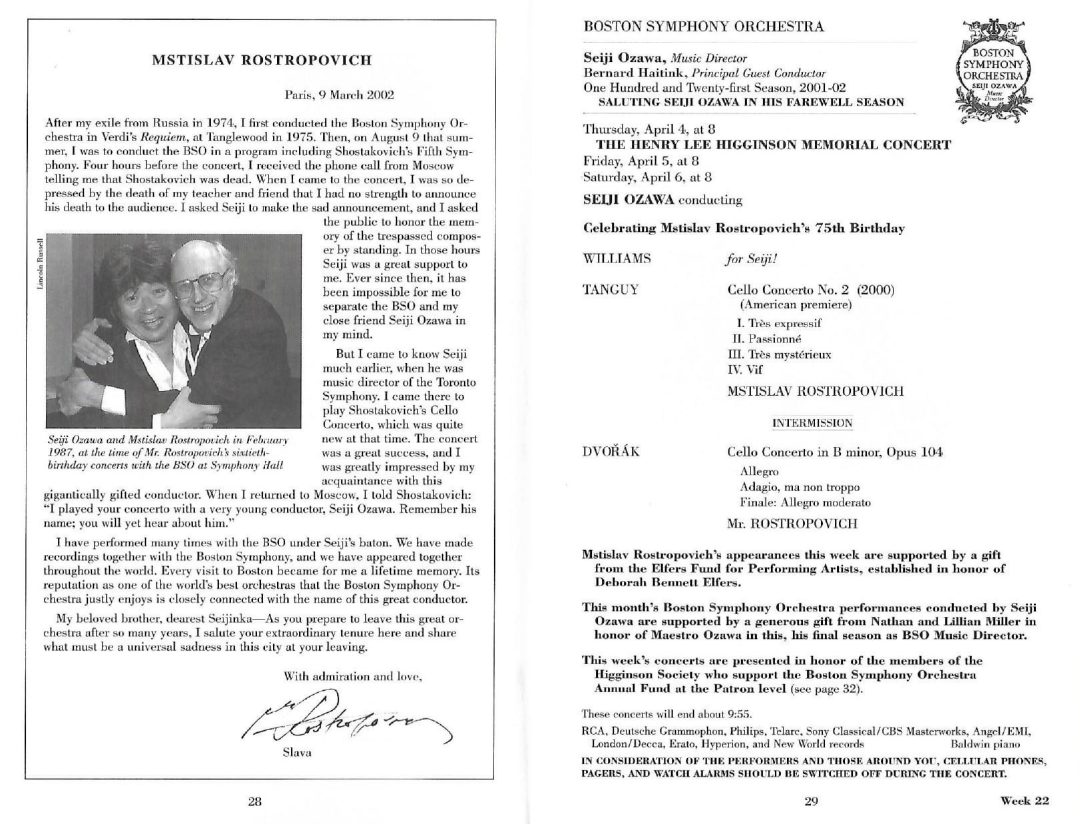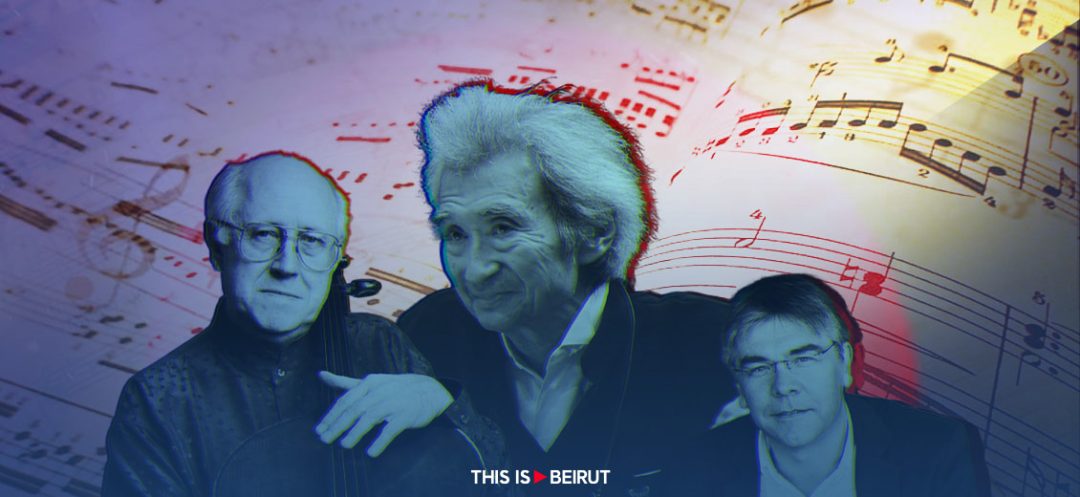Listen to the article
Seiji Ozawa, who conducted his symphony of life with unwavering passion until his last breath, gifts the world a musical legacy ripe with boldness, genius and profound artistic commitment. With Eric Tanguy, we go behind the scenes of one specific work, embellished by the tour-de-force interpretation of Mstislav Rostropovich, and masterfully conducted by the late Ozawa. We pay tribute to a man who truly deserved the title of “maestro.”
“Blue roses fill you with disquiet; against all odds, flowers will continue to bloom, even among the residents of the city of silence.” That is how the poet Alain Tasso sublimates Death as an ideal. He perceives it as a cemetery brimming with life, as flowers will never cease to rinse eyes hungry for existence. That is how one can recognize Life taught to them by Death, a life oh so fragrant. Indeed, there are silences that resonate. Overflowing with vitality, they defy death’s knell and hum the volatile memories that the mist could not cover. These butterflies skim across the soul’s dew with their evanescent tenderness and conduct, with the flapping of their wings, the requiem of those who are no more. Seiji Ozawa (1935-2024) has passed, carried by these same wings of time, to dwell in supreme Harmony, where the immortal skies shall, once more, witness his rendition of the waltzes of Johann Strauss II (1825-1899).
Artistic Refinement
Seiji Ozawa, one of the few true maestros of the second half of the twentieth century, stood apart with his bold and innovative approach, rejecting all sterile codes in favor of genuine musical effervescence. His career was an unending quest for artistic refinement. Ozawa’s ability to merge technical discipline with vibrant spontaneity made him a visionary, committed to unleashinf the emotional power of music. Tutored by the legendary Herbert von Karajan (1908-1989) and the equally exquisite Leonard Bernstein (1918-1990), his name is engraved among the greats. In a career spanning over half a century, Ozawa conducted a plethora of orchestras before joining the Boston Symphony Orchestra in 1973 where, for more than three decades, he left an indelible mark as musical director. Seiji Ozawa was hailed for his passion, mastery and commitment, which made him one of the most influential and revered figures of Western art music.
A Faithful Veteran
The so-called classical music scene mourns the passing of one of its most faithful veterans, who joined virtuoso cellist, Mstislav Rostropovich (1927-2007). To commemorate the Japanese genius, French composer Eric Tanguy shares details about his collaboration with the two, in an exclusive interview with This Is Beirut, “Rostropovich commissioned me to compose a concerto for cello, which I finished in 2000. The performance took place in Reims, in July 2001, with the Orchestre national d’Île-de-France, conducted by Jacques Mercier,” he recalls. A few weeks before the event, Rostropovich was in Amsterdam for a concert and, as he was rehearsing for the solo part, he drew the attention of Seiji Ozawa. Intrigued, Ozawa immediately asked Rostropovich about the partition, “It’s a concerto written by a young French composer,” the latter replied. The Russian cellist’s answer piqued the interest of the Japanese conductor, who demanded to see the partition itself. “Seiji Ozawa instantly said that he would perform it in the United States the year after,” Eric Tanguy confided, highlighting the random nature of the event in question, “If Ozawa had come ten minutes later, or ten minutes earlier, he would have never heard the concerto, and we would have never met.”
A Proponent of Musical Creation
“Ozawa’s remarkable singularity is made manifest by his expertise as conductor of the big repertoire, and by his relentless curiosity when it comes to the work of composers from his generation,” the French artist states. In fact, through the years, Ozawa stood out as a proponent and ambassador of Western art music in Asia. In particular, he shed light on the music of his peer, Tôru Takemitsu (1930-1996), but also of Swiss composer Arthur Honegger (1892-1955), and the French repertoire, from Maurice Ravel (1875-1937) to Olivier Messiaen (1908-1992) and Henri Dutilleux (1916-2013), more notably. “I have had the privilege to be one of the very last living composers to have had their music conducted by Ozawa,” Tanguy adds. His first meeting with Ozawa, centered around the cello concerto, took place at the Vienna Opera House in the dressing room of the latter, “I was only 33 years old at the time, and I was standing before a giant of musical creation,” Tanguy remembers candidly. “He was the greatest conductor of the time, and the most fascinating. I shared a moment with an extremely kind, simple and professional man, who asked very specific questions.”

Farewell Tour
The concerto’s first performances in the United States took place in Boston, on April 4,5 and 6, 2002, followed by two additional concerts at the prestigious Carnegie Hall in New York. “Ozawa conducted with exceptional clarity, clinical precision, and extreme sensitivity to musical phrases and color. He was this close to perfection. He had the genius of a conductor, he refined his sound with his orchestra over the years, and had a fusional relationship, both musical and friendly, with Rostropovich. I was blessed with a superb gift from the heavens,” the French composer says proudly. These concerts were of unique importance, as they were part of Seiji Ozawa’s farewell tour with the Boston Symphony Orchestra. His last performance as musical director occurred on July 14, 2002. The program included Hector Berlioz’s (1803-1869) “Symphonie Fantastique op. 14,” Ludwig van Beethoven’s (1770-1827) “Fantasy for Piano, Chorus and Orchestra in C minor, op. 80,” known as “Choral Fantasy,” and Randall Thompson’s (1899-1984) “Hallelujah” for a cappella choir.
Loyal to His Work
Undoubtedly, Seiji Ozawa epitomizes devotion for art. He placed music at the forefront and delved deep into what partitions express and require. His commitment and immersion into his craft clearly show in his interpretations. “I am deeply grateful to him for having programmed and conducted my music with so much emotion, respect and intensity. Ozawa will be a role model for generations of future conductors, as he is the perfect example of a man who prioritizes music over his own being,” Eric Tanguy concludes. Thus the curtain falls on the life of this great maestro who left a legacy of harmonies that will forever inspire musicians, artists, poets and music lovers alike. The emotions generated by his partitions shall continue to skim the heart and soul of those who had the privilege to taste the subtle magic of his wand.
Requiescat in pace, Maestro.



